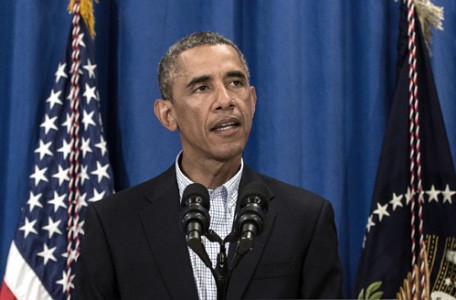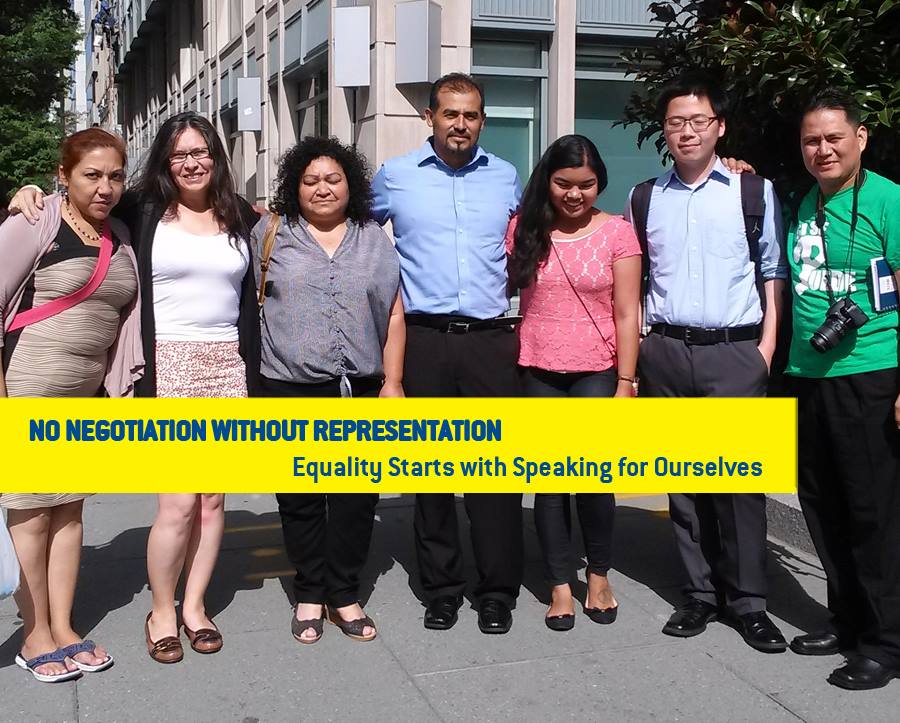- About
- Art
- Take Action
- Resources
- Donate
- Blog
All posts tagged #MyownAdvocate
By Angelica Chazarro
Even before the White House announced the decision to yet again prioritize elections over immigrant rights, Latino, labor, and immigrant leaders saw the writing on the wall. The announced delay was sadly predictable when President Obama has refused to meet in person with the people he is trying to deport every single day.
“I will not meet with the White House until he meets with the real leaders of this movement: those directly affected.” With those words last Friday, in a room full of Washington DC immigration advocates, the Vice President of the AFL-CIO, Tefere Gebre, announced his support for a boycott of White House meetings until those persons most directly impacted by the President’s deportation policies are included in a meaningful way.
On the same day, the National Hispanic Leadership Agenda—a coalition of 39 organizations including MALDEF, the HNBA, and NALACC—announced they would also join the boycott of immigration meetings with the President until they meaningfully include persons impacted by deportation policies. Read more
AN OPEN LETTER FROM
Undocumented Immigrants to President Obama:
“No More Meetings About Us Without Us”
President Barack Obama,
As active members of the undocumented community organizing in the United States we are asking you to include us in meetings about immigration and administrative relief. Simply stated, we are asking for there to be no more meetings about us without us. Through this inclusion, we hope to share with you not only our stories of how the deportation and immigration system has affected our lives and our communities, but importantly, our ideas and analysis about how the executive branch can make significant changes to reduce deportations and to provide relief.
Democracy and active citizenship are built upon full participation in the democratic process and we would like the opportunity to represent ourselves in the negotiations that will affect our lives. It would be an ironic injustice to segregate the undocumented to roles of storytellers and case studies, and deny our capacity to represent ourselves in efforts whose end goal is to recognize our full political equality. Instead, the effort for inclusion of immigrants can already begin to be realized by including us at the table as our own advocates.
Through taking extreme risk, immigrants have built unprecedented unity for expansive relief and an end to deportations. However, the undocumented immigrants still facing the threat of deportation who have created the moral urgency and political necessity through leading organizing in the field have hit a glass ceiling or border wall of advocacy when it comes to representing ourselves in Washington. Instead, those who have been invited to meetings to discuss the terms of such relief include individuals who worked counter to our demands and organizations who are not structured to represent those of us who will be helped or harmed and who do not have to respond to those of us who are.
We know that there are certain groups and individuals who are directly affected, in particular advocates who already qualify for the Deferred Action for Childhood Arrivals (DACA) program, who have attended some of these conversations but the undocumented community is not monolithic and requires diverse representation beyond those least targeted by enforcement measures and least likely to be left out of administrative relief. Unless there are other undocumented and diverse voices at the table, their presence is seen more as a token than as full representation.
We are not asking you to stop meeting with these advocacy groups or other stakeholders, we are only requesting to be included. People who will be directly affected by your decision are in the best position to explain to you the urgent need to expand relief in their communities, and to fight for significant changes.
As we move forward, we ask for the opportunity to work with you on the policy discussions to ensure we have reforms that will strengthen our families, immigrant communities and the nation as a whole. We too have worked very hard to make sure that people know our stories and the urgency of these needed changes for our community, often times putting our own bodies on the line to tell our stories, to stop deportations and to shut down sites of unjust enforcement. It doesn’t make sense to exclude us from the discussions after we set up the negotiating table.
NotOneMoreDeportation.com is a campaign made of individuals, organizations, artists, and allies to expose, confront, and overcome unjust immigration laws.
As the immigration debate continues, #Not1More enters the discussion from the place that touches people in concrete ways and can offer tangible relief. By collectively challenging unfair deportations and unjust policy through organizing, art, legislation, and action, we aim to reverse criminalization, build migrant power, and create immigration policies based on principles of inclusion.
Read More »
Sign the Pledge
I want to be part of the movement to stop deportations and win inclusion.


